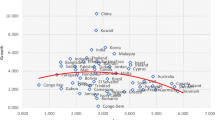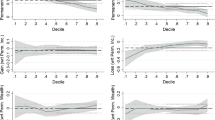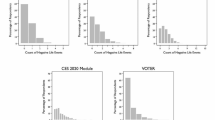Abstract
How do money and religion affect the support for revolt in nations? We take a different approach from previous studies to provide an answer by using micro-data based on surveys of revolutionary tastes of over 100,000 people living in 61 countries from 1981–1997. Controlling for personal characteristics and country fixed effects, a 4 percentage point decrease in the GDP growth rate increases the probability of a person wanting to revolt by 2.3 percentage points. This rise can be offset by belonging to a religion which lowers the probability of being revolutionary by between 1.8 and 2.7 percentage points (compared to non-religious people). The effect is concentrated amongst people who identify themselves as being Christian. By comparison, Muslims have similar chances of wanting to revolt as non-religious people.
Similar content being viewed by others
References
Alt J (1979) The politics of economic decline. Cambridge University Press, New York
Barro RJ, McCleary RM (2002) Religion and political economy in an international panel, NBER Working Paper No. 8931
Becker G, Stigler J (1977) De Gustibus Non Est Disputandum. Am Econ Rev 67(2):76–90
Berman E (2000) Sect, subsidy, and sacrifice: an economist’s view of ultra-orthodox Jews. Q J Econ 115(3):905–953
Coleman J (1990) Foundations of Social theory. Harvard University Press, MA
Collier P, Hoeffler A (2001) Greed and grievance in civil war. World Bank Policy Research Paper#2355
Doyle MW, Sambanis N (2000) International peacebuilding: a theoretical and quantitative analysis. Am Polit Sci Rev 94(4):779–802
Fearon, James and David Laitin (2001) quoted in “What Terrorists Want: Is there a Better Way to Defeat Al Qaeda?” by Nicholas Lemann, The New Yorker
Fearon, James, David Laitin (2003) Ethnicity, insurgency and civil war. Am Polit Sci Rev 97(1):75–90
Francisco R (1993) Theories of protest and the revolutions of 1989. Am J Polit Sci 37(3):663–680
Glaeser E, Glendon S (1997) The demand for religion. Harvard University mimeo
Guiso L, Sapienza P, Zingales L (2003) People’s opium? religion and economic attitudes. J Monet Econ 50:225–82
Gurr T, Moore W (1997) Ethnopolitical rebellion: a cross-sectional analysis of the 1980s with risk assessments for the 1990s. Am J Polit Sci 41(4):1079–1103
Hibbs D (1982) On the demand for economic outcomes: macroeconomic performance and mass political support in the United States, Great Britain and Germany. J Polit 43:426–461
Hirshleifer J (1995) Theorizing about conflict. In: Hartley K, Sandler T (eds) Handbook of defense economics, vol 1. Elsevier, Amsterdam, pp 165–192
Iannaccone LR (1992) Sacrifice and stigma: reducing free-riding in cults, communes, and other collectives. J Polit Econ 100(2):271–291
Iannaccone LR (1998) Introduction to the economics of religion. J Econ Lit vol 36(3):1465–1495
ICPSR (2000), World values surveys and European values surveys, 1981–1984, 1990–1993, and 1995–1997 [computer file]. Colchester, Essex: UK Data Archive [distributor], 21 February 2000. SN: 4366
Knack S, Keefer P (1997) Does social capital have an economic payoff? a cross-country investigation. Q J Econ 112(4):1251–1288
Krueger A, Maleckova J (2003) Education, poverty, political violence and terrorism: is there a causal connection?. J Econ Perspect 17(4):119–44
Kuran T (1991) The East European revolution of 1989: is it surprising that we were surprised? Am Econ Rev 81(2):121–125
Lohmann S (1994) The dynamics of informational cascades: the monday demonstrations in Leipzig, East Germany, 1989–91. World Polit 47:42–101
MacCulloch R (2003) The taste for revolt. Econ Lett 79:7–13
Marx K (1844) Contribution to the critique of Hegel’s Philosophy of right. in Deutsch-Franzosische Jahrbucher, Paris
Marx K (1887) Das Kapital. Progress Publishers, Moscow
Miguel T, Shanker S, Ernest S (2004) Economic shocks and civil conflict: an instrumental variables approach. J Polit Econ 112(4):725–753
Montalvo J, Reynal-Querol M (2002) The effect of ethnic and religious conflict on growth. PRPES Working Paper No. 15, Wheatherhead Center for International Affairs
Moulton B (1986) Random group effects and the precision of regression estimates. J Econo 32:385–397
Muller E (1985) Income inequality, regime repressiveness and political violence. Am Sociol Rev 50(1):47–61
Olson M (1965) The logic of collective action. Harvard University Press, Cambridge
Raines J (ed) (2002) Marx on religion. Temple University Press, Philadelphia
Roemer J (1998) Why the poor do not expropriate the rich: an old argument in new garb. J Public Econ 70:399–424
Sacerdote B, Glaeser E (2002) Education and religion. NBER Working Paper No. 8080
Sambanis N (2001) A review of recent advances and future directions in the quantitative literature on civil war. Def Peace Econ 13(2):215–243
Sigelman L, Simpson M (1977) A cross-national test of the linkage between economic inequality and political violence. J Conflict Resolut 21:105–128
Smith A (1776) An inquiry into the nature and causes of the wealth of nations. Modern Library New York (1965)
Weede E (1981) Income inequality, average income and domestic violence. J Conflict Resolut 25(4):639–654
Author information
Authors and Affiliations
Corresponding author
Rights and permissions
About this article
Cite this article
MacCulloch, R., Pezzini, S. Money, religion and revolution. Economics of Governance 8, 1–16 (2007). https://doi.org/10.1007/s10101-006-0014-z
Received:
Accepted:
Published:
Issue Date:
DOI: https://doi.org/10.1007/s10101-006-0014-z




